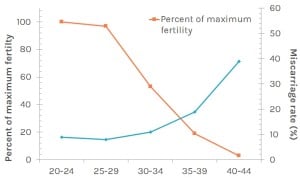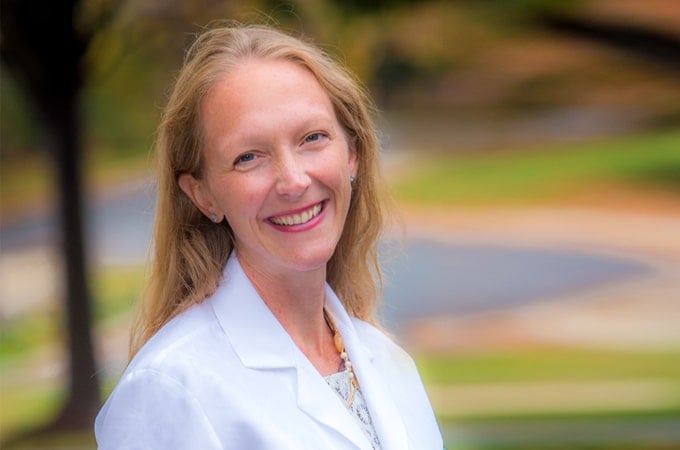Is it possible to slow down or stop the biological clock through egg freezing, and what are the financial details of it? Dr. Kate Devine, Co-Director of Research and practicing reproductive endocrinologist in SGF’s Washington D.C. K Street office answers these two important questions and much more on Fox 5 Good Day DC.
Can You Really Stop Your Biological Clock?

40 is not the new 20 when it comes to reproduction. In fact, while the optimal age to have a baby can vary person to person, on average, female fertility potential begins to decrease for women in their mid- to late-30s. As women age, both the quality and quantity of eggs will decrease, which ultimately increases the rate of miscarriage and chromosomal abnormalities, ultimately making it more challenging to have a baby.
Fortunately, while you can’t stop your biological clock, with egg freezing you are actually able to freeze eggs in time. Once eggs are retrieved, egg quality and egg quantity are preserved at the time of freezing and they remain at that same quality in storage with the same fertility potential until you come back to use them, should you need it.
The Benefit of a Backup Plan
Egg freezing isn’t for everyone, but for women who may benefit from this treatment we recommend women freeze in their 30s, somewhere between 30 and just beyond 35.
According to Dr. Devine, the benefits of egg freezing are more than just easing concern over reproductive aging, “In the time period after freezing her eggs, the woman is now feeling better about the probability of being able to have a child or multiple children in the future. She goes about her life and she feels more at ease about her reproductive potential and reproductive future. She can pursue her career, and she can make a good decision about who is that right person to start her family if that’s what’s on the agenda for her.”
How does it work when women return to use their thawed eggs?
Freezing does not seem to impact reproductive outcomes, and once thawed, the eggs are as good as if they were used at the time of freezing. Devine reassures, “There is an abundance of really high quality data at this point that suggests that these eggs perform very, very well.” Regarding surviving the thaw, “about 10 percent of eggs won’t survive thaw. However, if the eggs are vitrified at an experienced center — and I can’t emphasize enough how important it is for a woman to make sure she’s freezing her eggs at the right place — the eggs do seem to perform as well as if they had been used for IVF at the time they were originally frozen. With current technology the freezing does not seem to impact greatly the reproductive outcomes from the eggs,” Devine adds.
As for women who choose Shady Grove Fertility, the good news is that we have years of experience thawing both eggs and embryos. While the egg freezing technology has been around for several years, not as many fertility centers have experience thawing eggs, so we encourage women to choose wisely.
As stated by Dr. Devine, we encourage women to view egg freezing as a “backup plan.” We now have enough data to support egg freezing as a reliable option for women, and it’s best to be informed about your fertility. Even after freezing her eggs, in most circumstances it makes sense for a woman to try to get pregnant ‘the old fashioned way’ once she’s ready to have a baby. The difference is that she will do so with the peace of mind that if that doesn’t work out, her ‘younger’ eggs are ready and waiting.
How much does it cost to freeze eggs?
Like most fertility centers, SGF offers financing plans for the egg freezing treatment cycles. However, we have also developed several financial programs, such as the Egg Freezing Discount Program and Assure Fertility, to help more women access egg freezing if they are interested. The cost of each cycle and program includes monitoring appointments, cryopreservation of the eggs, and the first year of storage.
The Importance of Discussing Your Fertility and Egg Freezing
Anchor Holly Morris concluded the conversation saying, “I don’t think that women who are career oriented are thinking that they are not going to be able to have their kids later because they are fit and they feel young. Is it possible to have this conversation come from your OB/GYN when you are going yearly younger?”
Dr. Devine recommends women who are in their 20s ask their OB/GYN about their fertility, which can be tested through a blood test and ultrasound. For women who are in their 30s who know they want to have a baby one day, she recommends seeing a reproductive endocrinologist to discuss the possibility of egg freezing.chedule an Egg Freezing Appointment
To learn more about egg freezing and to ask Dr. Kate Devine questions, register for the upcoming egg freezing seminar in Washington D.C. on Tuesday, November 29. Or call 1-877-411-9292 to schedule an appointment with Dr. Devine or any of SGF’s 33 other reproductive endocrinologists.






